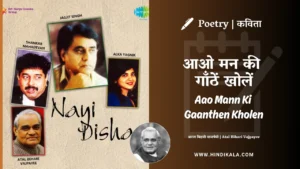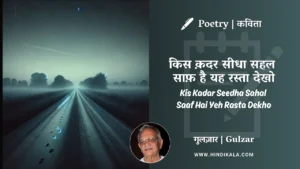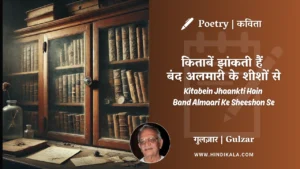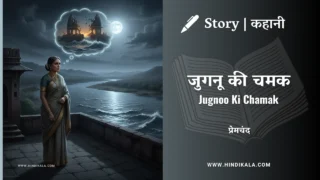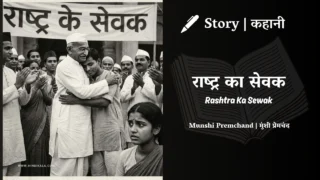Gulzar Poetry Inn Boodhe Pahadon Par Kuch Bhi To Nahi Badla in Hindi & English with Meaning (English Translation) | गुलज़ार – इन बूढ़े पहाड़ों पर कुछ भी तो नहीं बदला
Hindi Kala presents Gulzar Poetry Inn Boodhe Pahadon Par Kuch Bhi To Nahi Badla about old mountains in Hindi & English with the poem’s Meaning (English Translation).
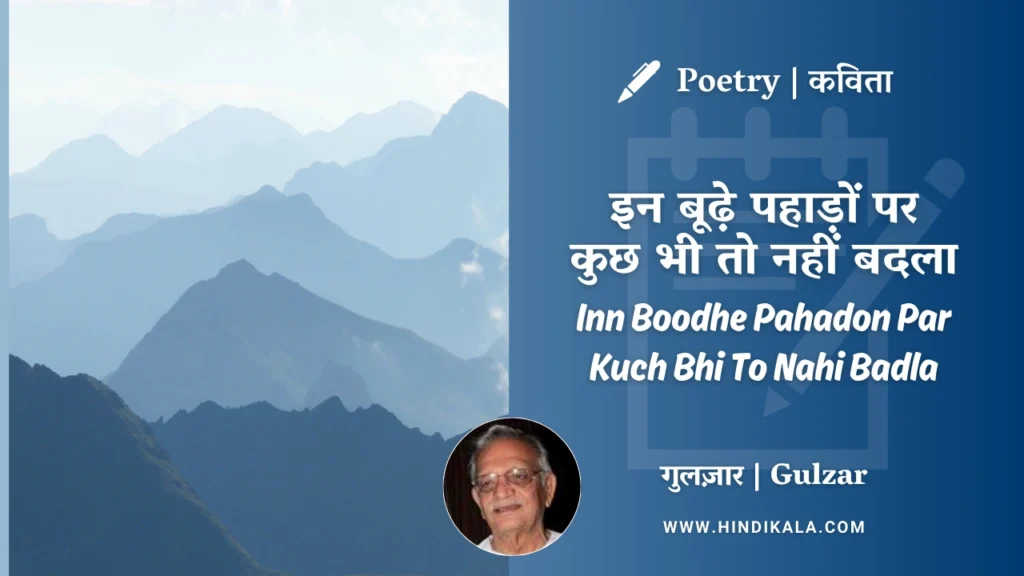
गुलज़ार की कविता इन बूढ़े पहाड़ों पर कुछ भी तो नहीं बदला
इन बूढ़े पहाड़ों पर, कुछ भी तो नहीं बदला
सदियों से गिरी बर्फ़ें
और उनपे बरसती हैं
हर साल नई बर्फ़ें
इन बूढ़े पहाड़ों पर….
घर लगते हैं क़ब्रों से
ख़ामोश सफ़ेदी में
कुतबे से दरख़्तों के
ना आब था ना दानें
अलग़ोज़ा की वादी में
भेड़ों की गईं जानें
संवाद:
कुछ वक़्त नहीं गुज़रा नानी ने बताया था
सरसब्ज़ ढलानों पर बस्ती गड़रियों की
और भेड़ों की रेवड़ थे
गाना:
ऊँचे कोहसारों के
गिरते हुए दामन में
जंगल हैं चनारों के
सब लाल से रहते हैं
जब धूप चमकती है
कुछ और दहकते हैं
हर साल चनारों में
इक आग के लगने से
मरते हैं हज़ारों में!
इन बूढ़े पहाड़ों पर…
संवाद:
चुपचाप अँधेरे में अक्सर उस जंगल में
इक भेड़िया आता था
ले जाता था रेवड़ से
इक भेड़ उठा कर वो
और सुबह को जंगल में
बस खाल पड़ी मिलती।
गाना:
हर साल उमड़ता है
दरिया पे बारिश में
इक दौरा-सा पड़ता है
सब तोड़ के गिराता है
संगलाख़ चट्टानों से
जा सर टकराता है
तारीख़ का कहना है
रहना चट्टानों को
दरियाओं को बहना है
अब की तुग़यानी में
कुछ डूब गए गाँव
कुछ बह गए पानी में
चढ़ती रही कुर्बानें
अलग़ोज़ा की वादी में
भेड़ों की गई जानें
संवाद:
फिर सारे गड़रियों ने
उस भेड़िए को ढूँढ़ा
और मार के लौट आए
उस रात इक जश्न हुआ
अब सुबह को जंगल में
दो और मिली खालें
गाना:
नानी की अगर माने
तो भेड़िया ज़िन्दा है
जाएँगी अभी जानें
इन बूढ़े पहाड़ों पर कुछ भी तो नहीं बदला…
Gulzar Ki Kavita Inn Boodhe Pahadon Par Kuch Bhi To Nahi Badla in Roman Transcript
Inn Boodhe Pahadon Par Kuch Bhi To Nahi Badla
Sadiyon Se Giri Barfen
Aur Unpe Barasti Hain
Har Saal Nai Barfen
In Boode Pahadon Par…
Ghar Lagte Hain Qabron Se
Khamosh Safedi Mein
Qutbe Se Darakhton Ke
Na Aab Tha Na Daane
Alagoza Ki Waadi Mein
Bhedon Ki Gayin Jaanen
Samvad:
Kuch Waqt Nahi Guzra Nani Ne Bataya Tha
Sarsabz Dhalanon Par Basti Gadriyon Ki
Aur Bhedon Ki Rewad The
Gana:
Unche Kohsaron Ke
Girte Hue Daaman Mein
Jangal Hain Chanaron Ke
Sab Laal Se Rehte Hain
Jab Dhoop Chamakti Hai
Kuch Aur Dahakte Hain
Har Saal Chanaron Mein
Ek Aag Ke Lagne Se
Marte Hain Hazaron Mein!
In Boode Pahadon Par…
Samvad:
Chupchaap Andhere Mein Aksar Us Jangalon Mein
Ek Bhediya Aata Tha
Le Jaata Tha Rewad Se
Ek Bhed Utha Kar Wo
Aur Subah Ko Jangalon Mein
Bas Khaal Padi Milti
Gana:
Har Saal Umadta Hai
Dariya Pe Barish Mein
Ek Daura-Sa Padta Hai
Sab Tod Ke Girata Hai
Sanglaakh Chattaan Se
Ja Sar Takrata Hai
Tareekh Ka Kehna Hai
Rehna Chattaanon Ko
Dariyaon Ko Behna Hai
Ab Ki Tugyaani Mein
Kuch Doob Gaye Gaanv
Kuch Beh Gaye Paani Mein
Chadhti Rahi Qurbaanen
Alagoza Ki Waadi Mein
Bhedon Ki Gayin Jaanen
Samvad:
Phir Saare Gadriyon Ne
Us Bhediye Ko Dhoonda
Aur Maar Ke Laut Aaye
Us Raat Ek Jashn Hua
Ab Subah Ko Jangalon Mein
Do Aur Mili Khalen
Gana:
Nani Ki Agar Maane
To Bhediya Zinda Hai
Jayengi Abhi Jaanen
In Boode Pahadon Par Kuch Bhi To Nahi Badla…
Gulzar Hindi Poetry Inn Boodhe Pahadon Par Kuch Bhi To Nahi Badla Meaning (English Translation)
On these old mountains, nothing has changed
Snows that have fallen for centuries
And new snows fall on them
Every year on these old mountains…
Houses seem like graves
In the silent whiteness
From the poles to the trees
There was no water, no grain
In the Alagoza valley
The sheep perished
Dialogue: Not long ago, my grandmother told me
On the verdant slopes, there was a settlement of shepherds
And flocks of sheep
Song:
In the falling skirts of the high mountains
There are forests of poplar trees
They all turn red
When the sun shines
They burn even more
Every year in the poplars
A fire ignites
Killing thousands!
On these old mountains…
Dialogue: Silently in the darkness, often in that forest
A wolf would come
He would take a sheep from the flock
And in the morning in the forest
Only the skin would be found.
Song: Every year, a flood rises
In the river during the rains
A wave comes
Breaking everything
From the rocky cliffs
It strikes its head
History says
The rocks remain
And the rivers flow
In this recent flood
Some villages were submerged
Some were swept away by the water
The sacrifices kept rising
In the Alagoza valley
The sheep perished
Dialogue: Then all the shepherds
Searched for the wolf
And killed it, returning
That night there was a celebration
Now in the morning in the forest
Two more skins were found
Song: If you believe my grandmother
The wolf is still alive
They will soon know
On these old mountains, nothing has changed…
Essence of the Poem
This poem paints a bleak and cyclical picture of life in a mountainous region, where nature’s forces often bring destruction and loss.
Key Themes:
Cycle of life and death: The poem emphasizes the never-ending cycle of life and death, which is symbolized by the floods, burning forests, and falling snow.
Human interaction with nature: The destructive effects of human behavior are frequently demonstrated in the exploration of the relationship between humans and the natural world.
Loss and grief: As the community loses homes, livestock, and loved ones, the poem is rife with a sense of loss.
The enduring power of nature: Nature frequently wins out despite human attempts to control it, resulting in loss and destruction.
Interpretation:
The poem can be interpreted as a lament for nature’s destructive force and the frailty of life. Awe and fear are evoked by the images of the ancient mountains, the flaming forests, and the raging floods. The poem’s human characters are powerless to break free from nature’s destructive cycles.
The poem also discusses themes of hope and resiliency. In spite of the frequent losses, the community keeps moving forward and rebuilding. The last lines imply that nature will find a way to balance itself even after the wolf is killed and that the cycle of life and death never ends.
You Might Also Like
Tags:


